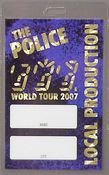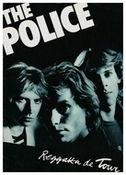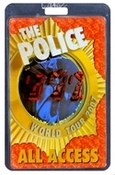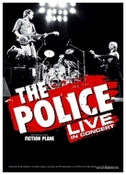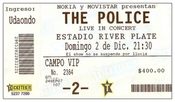
The Police, the great rock epic...
Presentation of The Police. With Sting on vocals and bass, Andy Summers on guitar, and Stewart Copeland on drums and percussion. Opening: Borgesian Tales and Beck. The day before yesterday and yesterday, at River Plate Stadium.
Just a couple of phone calls were enough for Sting, Andy Summers, and Stewart Copeland to leave behind everything they'd been entertained with for over twenty years and return to enjoy the great rock epic. Because just as The Police defined an era and made the transition from the 70s to the 80s more bearable, they also set the pace for this season, marked by surprising returns.
After the trio's short but powerful life that brought them to Buenos Aires for the first time in 1980, only Sting, with his solo career, remained on the stadium rock scene. And judging by yesterday's show at the Monumental de Núñez, the passage of time only brought gray hair and a few extra pounds. These three gentlemen were powerful. The Englishmen proved that it was no coincidence that they had inspired hundreds of bands: impeccable, precise, and fast when they needed to be, they kept an audience enthralled from start to finish for over a hundred minutes. And they gave them what the more than 60,000 people came looking for: the band's classics performed in their original versions, altered only by a few instrumental passages.
After the set by Cuentos Borgeanos, the only local opening act, Beck quietly appeared. Dressed in black and wearing a witch's hat, he played for an hour for an audience that preferred to visit the merchandise stand rather than enjoy the Los Angeles genius. Supported by a solid quartet of guitar, bass, drums, and keyboard-programming, he managed to fulfil his role as a guest despite the typical "tiny" sound that every guest at a party that isn't their own must live with.
Aside from a few poorly executed tracks by the keyboardist, Beck more than delivered with a setlist that spanned several of his albums and managed to get the crowd moving thanks to the most irresistible tracks in his repertoire: "Pollution," "Where It's At," and a rousing version of "Girl," which intertwined with the chaos of "Minus." Another element marred his set: the daylight. Toward the end, and with the night now as a backdrop, the "witch" found a better environment to spread her magic potion.
Exactly an hour passed between Beck's end and The Police's beginning, enough time to see how the stalls, the field (both the VIP and the "worker"), and even, far away, the popular seats filled up. Nearby, about 30 meters away, a mobile camera was suspended, which will surely provide some of the most striking images on the tour DVD. Because the two Buenos Aires shows will produce the most accomplished memory of the reunion. But no one is willing to wait for that edition. Everyone wants their piece of the story. So when the trio takes the stage, two passions are unleashed: that of the fans ready to sing along to every single song, and that of the other fans, those who take out their cameras and cell phones to incessantly record images of dubious quality. In the VIP field, an audience ranging from thirty-somethings to forty-somethings can be distinguished. But they all become a uniform mass when the magnificent three take the stage.
If Sting was questioned for years about a possible Police reunion, imagine the wait for those who threw imaginary bottles into the sea with their wishes inside. 'Message In A Bottle', yes, it marked the beginning of a journey through time that, for its protagonists, has a precise era and coordinates, but not so for the thousands on the other side. The trio's music never stopped playing throughout these decades and has withstood the onslaught of synthesizers, grunge, alternative rock...
Three screens as a backdrop will bring Sting, Summers, and Copeland back to stadium-sized proportions. On the sides, the two obligatory screens and a pair of giant panels that stretch from the floor to the ceiling of the stage and will light up at various points during the concert. Above, a kind of curved visor connects these two panels and interacts with them. Below are the trio, enclosed in a circle of light, with the vocals located to the right of the rig, the guitar in the centre, and the drums at the rear. Later, the way each one experiences the show will yield different responses from the audience. Sting only moves away from his place in the most intense passages, Summers remains imperturbable in his place and Copeland inspires praise from an audience that sees him energetically hit his drums and, at times, jump from his drum set to a percussion set (brass, drums and even a gong) without any gaps in between.
"How's Buenos Aires?" Sting will greet after the opening number, and then immediately ask the audience to express themselves more forcefully. And that will happen immediately: "Synchronicity II" and "Walking On The Moon" will provide no respite and will compose an ideal beginning. From then on, no one will leave the bubble. Classic in several senses, the trio communicates with the audience in the old-fashioned way, inciting active participation and using babbling tics, like that children's game called "Do do do da da da" and, later, "ie io ieooo," to build a bridge between one side of the stage and the other. After feinting with "Voices Inside My Head," they launch into "When The World is Running Down..." and then "Don't Stand So Close To Me." Tight and with their groove intact, the trio continues with "Driven To Tears," "Hole in My Life," and "Truth Hits Everybody." Summers is unfazed, Sting delivers a few words of Spanish between songs, and Copeland seems constantly on the verge of collapse, his mouth always open and his enormous eyes hidden behind his glasses.
The instruments are historic: Sting's old, battered bass is from the heyday; The Police logo seems to have been on the drum kit forever, and the images that accompany the (subtle, by the way) set represent the trio's different stages and albums. With 'Wrapped Around Your Finger,' the all-terrain Copeland appears, alternating drums with percussion and exaggerating his movements to provide those circus-like touches that every self-respecting megashow should have. There's also a moment of reflection, a moment to stop and think for just a moment that not everyone is having as good a time as we are: 'Invisible Sun' delivers images of children with lost little eyes, perhaps looking toward a more prosperous place than the one they once lived in. 'Roxanne' marks the first farewell, but not the last. After a long and moving version of 'So Lonely,' 'Every Breath You Take' calms the beasts and provides the most syrupy passage of the show. They're leaving, but you know, there's going to be one more, and it's 'Next To You'. "Argentina, goodbye; my dear friends, thank you very much," Sting will say as a finale, representing the trio. If comeback tours are the aftermath of every great band's life, then comebacks are a fundamental part of their careers. They'll have proven they can still rock out to packed stadiums; we'll have proven that time hasn't passed in vain. It took our years, but it left us with enough music to remember them by.
(c) La Nacion by Sebastián Espósito
December 2, 2007
SET LIST
- Message In A Bottle
- Synchronicity II
- Walking On The Moon
- Voices Inside My Head
- When The World Is Running Down You Make The Best Of What's Still Around
- Don't Stand So Close To Me
- Driven To Tears
- Hole In My Life
- Truth Hits Everybody
- Every Little Thing She Does Is Magic
- Wrapped Around Your Finger
- De Do Do Do, De Da Da Da
- Invisible Sun
- Walking In Your Footsteps
- Can't Stand Losing You
- Roxanne
- King Of Pain
- So Lonely
- Every Breath You Take
- Next To You

